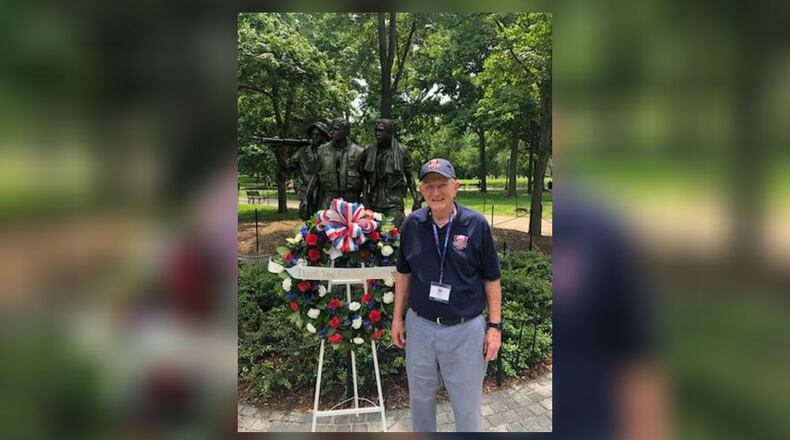But then, a few years ago, though the trauma never subsided, the importance of discussing his time was evident.
Nieters, a 1959 Hamilton Catholic graduate, was visiting his sister and her family in Fairfield. His nephew was going through some of his paternal grandfather’s military effects. Specifically, he was trying to find out what he did as a pilot in the time just before and during World War II.
“He never talked about it, and they didn’t know anything about what he did, and he was trying to find something on what he did while he was in service and having a very, very difficult time,” said Nieters. “I thought, ‘That’s a shame. That’s lost forever.’”
However, he didn’t think much more of it until his granddaughter, then a college sophomore in North Carolina, called him about six months after that interaction with his nephew and asked about his Vietnam experience.
She wanted to know.
That’s when he decided that 50-plus years of not talking was probably enough time to keep it to himself. He took pen to paper after he found out about a writing class for veterans in Ashville, NC. Nieters didn’t know until later it was a therapeutic group for veterans suffering from PTSD.
That’s not what he signed up for, but he marched on and muscled through the course. In a notebook of college-ruled paper, he made an outline of places he was stationed in Vietnam and wrote. And wrote. And wrote.
“I didn’t think this would take too long, but when I got through, it was 252 pages,” Nieters said, a captain in the Army.
He’s not a typist, so he dictated his manuscript into a computer document ― and realized later the listening issues of voice-to-text as there were a few typos ― and gave his personal accounts to his family. But it was the couple of fellow veterans he gave a copy of his book to who told him, “You ought to publish this.”
After taking a little convincing, because it was only to be a family history, his fellow veterans told him they believed it would be therapeutic for any veteran suffering from PTSD.
Nieters had the head of his PTSD therapy group and the chaplain at the Ashville, Va. and asked them the same question: “Do you think this will help veterans?”
Both had the same answer: “Yes.”
After talking with a local Spartanburg publisher, they produced the book, and “Cryless” is now available on Amazon.com.
“I’m going to have PTSD for the rest of my life,” Nieters said. “There’s no cure, but I liken it to a spring being wound very tight, and by writing this, some of the tension was relieved.”
After writing about it, now he can talk about it, though he does get emotional. It’s still tough.
Nieters is a decorated veteran, having earned multiple medals, including four bronze stars and two silver stars. Five of those six medals were for risking his life while the enemy fired upon him and others in order to save wounded soldiers in the field.
If a helicopter couldn’t go in to get a soldiers, or soldiers, out of harms way, they asked for volunteers to help get the guy out. Neiters volunteered.
“That’s what I did most of the time. I always did,” he said. “And just was damn lucky.
Nieters was born in Cincinnati, and his family moved to Lawn Avenue when he was in the second grade. After graduating at the top of his class at Hamilton Catholic High School, he received an academic scholarship to attend the University of Dayton. After three years at Dayton and not graduating, he applied to and was accepted to medical school at St. Louis University, something that cannot be done today.
After his medical internship at Milwaukee County General Hospital, he was drafted. He was at Fort Sam Houston in San Antonio, Texas, in August 1967 and was in Vietnam by that September. He was a medical officer assigned to the 2nd Batallion, 39th Infantry, 9th Infantry Division.
The majority of the memoir is about that experience in Vietnam, from those experiences that led to his medals to his feelings of sewing and patching up young soldiers just to send them back out “to the meat grinder.” Happy to be able to heal their physical wounds, aggravated they’re going back out to a possible death sentence.
“That was a dichotomy of feelings,” he said.
One of the toughest struggles for Nieters was a decision he made about a medic he didn’t pull from the field in time.
Every time he visits the Vietnam Memorial in Washington, D.C. ― 27 times and counting ― the first name he seeks out is Spc-5 Clifford Stapleton, a medic from Newark, Ohio. During the tour, medics would spend six months in the field and six months out of the field where it was safer. He always sent medics to the field late and pulled them out of the field early.
But Nieters was hospitalized in Saigon for 27 days with dysentery. It took medics from his unit a while to find him, and when one of his medics came to see him, “The first thing I said was, ‘Get Stapleton out of the field.’ And they said he was killed five days ago.”
Proceeds from Nieters’ books support veterans’ causes, including the Wounded Warrior Project.
About the Author




